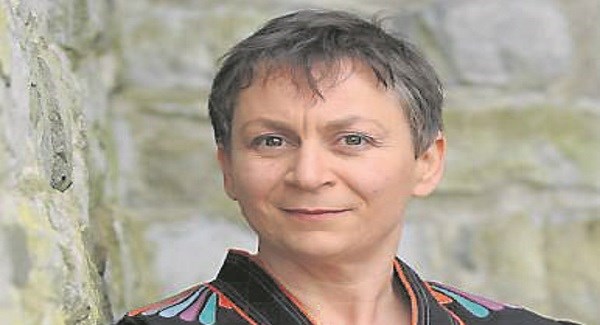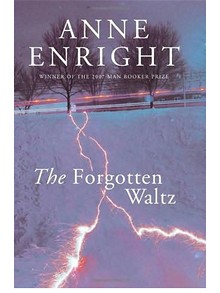
Like The Gathering (2007), Enright establishes her story, this story, as having happened in the past but tells it in the present; or at least that seems to be the case as I finish page 1. I have a thing about page 1.
It is some years ago now. The house is new and this is my sister’s housewarming party …
Many readers I know have an aversion to narratives in the present tense but it gives the impression that the writer is telling you right now about a past event, but by telling it as if it is happening now gives the narrative the immediacy of gossip – and we all like gossip. It gives the reader a sense of it not having been written for you but of it being told to you, and only you, at this moment; even if the prose slips into the past at times.
They have mini-marshmallows on top. She goes to pop one in her mouth, then pulls back in surprise.
‘Ooh, pink!’ she says.
I don’t know what I was waiting for.
Not “I didn’t know what I was waiting for” (both verbs in the past) nor “I don’t know what I am waiting for” (both verbs in the present) but the first (do) in the present and the second (was) in the past.
It feels like there are two narratives going on here: the story itself (in the past) and the telling of it (in the present). But this is what I think we all do when we tell someone now about something that happened then, and by using this double-tense Enright is being conversational, conspiratorial, and so making us feel comfortable and special: a real friend. Readers love this.
I don’t think Enright is conscious of this nor does she sit down meticulously studying the verbs and deciding which tense they should be to get the effect she is after. My mentioning it is, however, a serious attempt to describe how a writer gets this conspiratorial, gossipy, tone into their writing. In order to get this particular tone the writer needn’t manipulate it- in fact, shouldn’t manipulate it – but needs to be thinking in this particular tone so the tone in the head becomes the tone on the page.
Or you may think I’m being a wanker and why don’t I get on with it and just read the bloody thing? OK, I will.
On page one, line one, we are given the nut of it.
I met him in my sister’s garden in Enniskerry.
This is the first person account of a woman, Gina Moynihan, and her sexual obsession for a man, Sean Vallely, who like her, is married to someone else.
Enright writes Gina’s monologue as if she’s explaining, justifying at a crackling pace, to a … a … psychologist. She’s keen, this Gina, to tell us everything, but also to leave us guessing:
We managed to linger after everyone had gone, and the details of what corner we found and what we did; how we managed it, and who put what where, are nobody’s business but our own.
and, of course, by NOT telling us the details our minds race frantically with all sorts of images of ‘doing it’ and ‘putting what where’ and in ‘whose corner’ and ‘managing it where?’ that we’re all in a lather anyway.
Her prose has a momentum that belies the action. There is action everywhere whereby reading it makes you feel exhausted; there’s a breathless tone to the reading, like a theatrical monologue some aspiring, or reviving, actor does of The Gospel According to Matthew. The Gospel According to Gina; where a simple static description is busy with verbs:
Lines of black posts marched down to the shoreline, small and smaller, overtaken, each in their turn by the shifting sand.”
There’s ‘marching’ and ‘overtaking’ and ‘shifting’; so much happening, so many doing words, but it’s just the view of a bloody empty beach! The empty beach seems as busy as the sex in the corner.
Gina is self-possessed, or maybe just blind, but she has no thought that just as she has a keen sense of perspicacity other people might have a similar talent. She can see through everyone but she is certain no one can see through her. She thinks her secret is safe. This is the tension.
She’s not very likeable – in fact, I’d be very wary of having her at my lunch table, but you’re flattered that she’s confiding in you so much of what she’s thinking and feeling; it’s all so intimate, that you would have to admit your friendship with her even if only to bolster your own standing. Like admitting to a friendship with a Weinstein simply because he’s famous and he talked to you once.
There was a time when “Prefaces” or “Introductions” were mis-understood and not seen as part of the story – we couldn’t wait to get to Chapter 1, for the story to begin – which I think now has, thank god, changed, but Enright starts the book with a “Preface” that you MUST read as it pre-empts the story: Sean’s little troubled girl, Evie, sees Gina and he kissing and it is seen as the “first official occasion” of their love. Enright has used this devise – a child witnessing something very ‘adult’ – before, in The Gathering, and admits in an interview that after writing this preface scene says to herself,* “Oh God! I’ve done it again.” But the pivotal scene is the pivotal scene and once it’s there, it must remain.
It’s not giving anything away to say that the book is about an affair; it’s not the affair, nor even its aftermath that interests Enright, what interests her is how Gina sees it, manipulates it, how a woman sees herself, loses herself, against a background of an Ireland where such a thing, not so long ago, would’ve been the end of her; the end of everything for her. It’s hard to think of the Ireland then, and the Ireland now with it’s same-sex marriage legislation, its abortion referendum (May 25, 2018), and it’s out, gay, Prime Minister of Indian parentage.
The affair is exciting, propelling, and with a momentum all of its own, because it isn’t, has nothing to do with, the domestic. The two adulterers – such a loaded term – know little about each other, hardly speak:
“All this. Have you done it before?”
“Well, you know,” he said.
Their affair progresses on “in its Friday pace,” and it’s this that Gina loves. It’s just about fucking every Friday. The ‘falling in love’ bit could ruin it all! But they do; or, at least. she does. The ‘wife’, Sean’s wife, Aileen, isn’t Gina’s nemesis, as one would expect, that role falls to Evie, Sean’s little ‘mistake’ of daughter. She’s enigmatic, chubby, but plain, and not at all healthy, but it’s the daughter that, if any atonement is to be got for Gina and her wild imagination – and all of it could just be that – then it will come via Evie; it’s Evie she also needs to woo.
This is the third Enright I’ve read in a row: an Enright-fest. She has rocketed to the top, well, near the top, of my favourite-writer list: Colm Tóibín still holds my #1 place although Enright, John Boyne, Patrick Gale, and Sebastian Barry are barking at his heels. She says she doesn’t know what she will write next; she’ll find out, I’m sure, and do it. Soon, I hope.
You can purchase the book, in various formats, here.
* The presenter and interviewer are a little boring, fast forward through them to get to the good bits: Enright, herself.
